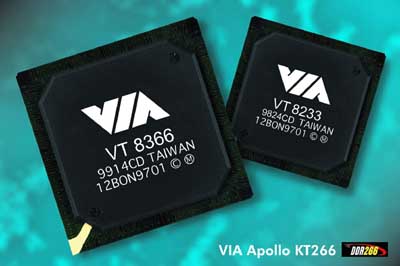Nieuwe bevindingen van OC Workbench met betrekking tot de performance problemen van de VIA Apollo KT266 chipset doen vermoeden dat de slechte performance van de KT266 niet alleen door onvolwassen BIOS versies wordt veroorzaakt. Gisteren heb je in deze nieuwsposting kunnen lezen dat een simpele BIOS update van versie 1.00 naar 1.09 de prestaties van de MSI K7T266 Pro aanzienlijk deed verbeteren.
OC Workbench kreeg door Gigabyte twee 7VTX mobo's opgestuurd. Het eerste exemplaar was voorzien van het P18 pre-productie BIOS en het tweede exemplaar werd met de recentere P28 BIOS release geleverd. Het P28 bord was aanzienlijk sneller dan de plank met het pre-productie BIOS, maar het eerste bord bleef ook met het P28 BIOS slecht presteren. Kennelijk heeft de matige performance te maken met een hardwarematig probleem, mogelijk zelfs ontwerpfouten. Dit zou de reden kunnen zijn waarom veel fabrikanten wachten met de release van hun KT266 mobo's:
Gigabyte sent me 2 boards altogether. The first board came with P18 preproduction BIOS and the performance is bad. The second board came with P28 BIOS and the performance improved drastically by almost 40%. I flashed P28 BIOS onto the first board and maximise the settings and found out that the first board still performs badly.My conclusion is that, there might be design flaws on the first board and Gigabyte resolved it in the second. It's not a BIOS problem, rather it could be the design flaw! That is also why most of the mainboard manufacturers are holding back their KT266 releases.
This goes right along with previous evidence. First, Abit informed us that performance greatly picked up after a BIOS update on their KR7-RAID. Also, we tested the new reference KT266 BIOS with great success. This appears to put the final nail in the coffin of confusing KT266 performance.
 |

:strip_exif()/i/995737809.jpg?f=thumbmedium)
